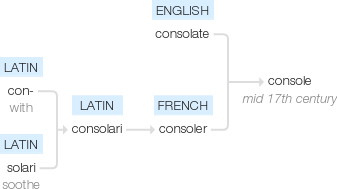Console
mid 17th century (replacing earlier consolate ): from French consoler, from Latin consolari, from con- ‘with’ + solari ‘soothe’.
wiktionary
Borrowed from French console(“a bracket”), from consoler(“to console, to comfort”), as in verb.
Sense of “bracket” either due to a bracket alleviating the load, or due to brackets being decorated with the Christian figure of a consoler, [1] itself perhaps a pun on the first sense (alleviating load).
Originally used for the bracket itself, then for wall-mounted tables (mounted with a bracket), then for free-standing tables placed against a wall. Use for control system dates at least to 1880s for an “organ console”; use for electrical or electronic control systems dates at least to 1930s in radio, television, and system control, particularly as “mixer console” or “control console”, attached to an equipment rack. This was popularized in computers by mainframes such as the IBM 704 (1954) in terms such as “operator’s console” or “console typewriter”, and then generalized to any attached equipment, particularly for user interaction. The automotive sense harks back to earlier use as “support”.
Borrowed from French consoler, from Latin cōnsōlor(“I console, I offer solace”), root from Proto-Indo-European *sōlh₂-(“mercy, comfort”) (whence also solace).
etymonline
console (v.)
"alleviate the grief or mental distress of," 1690s, from French consoler "to comfort, console," from Latin consolari "offer solace, encourage, comfort, cheer," from assimilated form of com-, here perhaps an intensive prefix (see com-), + solari "to comfort" (see solace (n.)). Or perhaps a back-formation from consolation. The Latin word is glossed in Old English by frefran. Related: Consoled; consoling.
console (n.)
1706, "a cabinet; an ornamental base structure," from French console "a bracket" (16c.), which is of uncertain origin, possibly from consolateur, literally "one who consoles" (see console (v.)), being used somehow for carved human figures supporting cornices, shelves or rails in choir stalls. Another guess connects it to Latin consolidare "to make solid" (see consolidate).
The sense evolved to "body of a musical organ" (1881), "radio cabinet" (1925), then "cabinet for a TV, stereo, etc." (1944). Console-table is attested from 1813.
